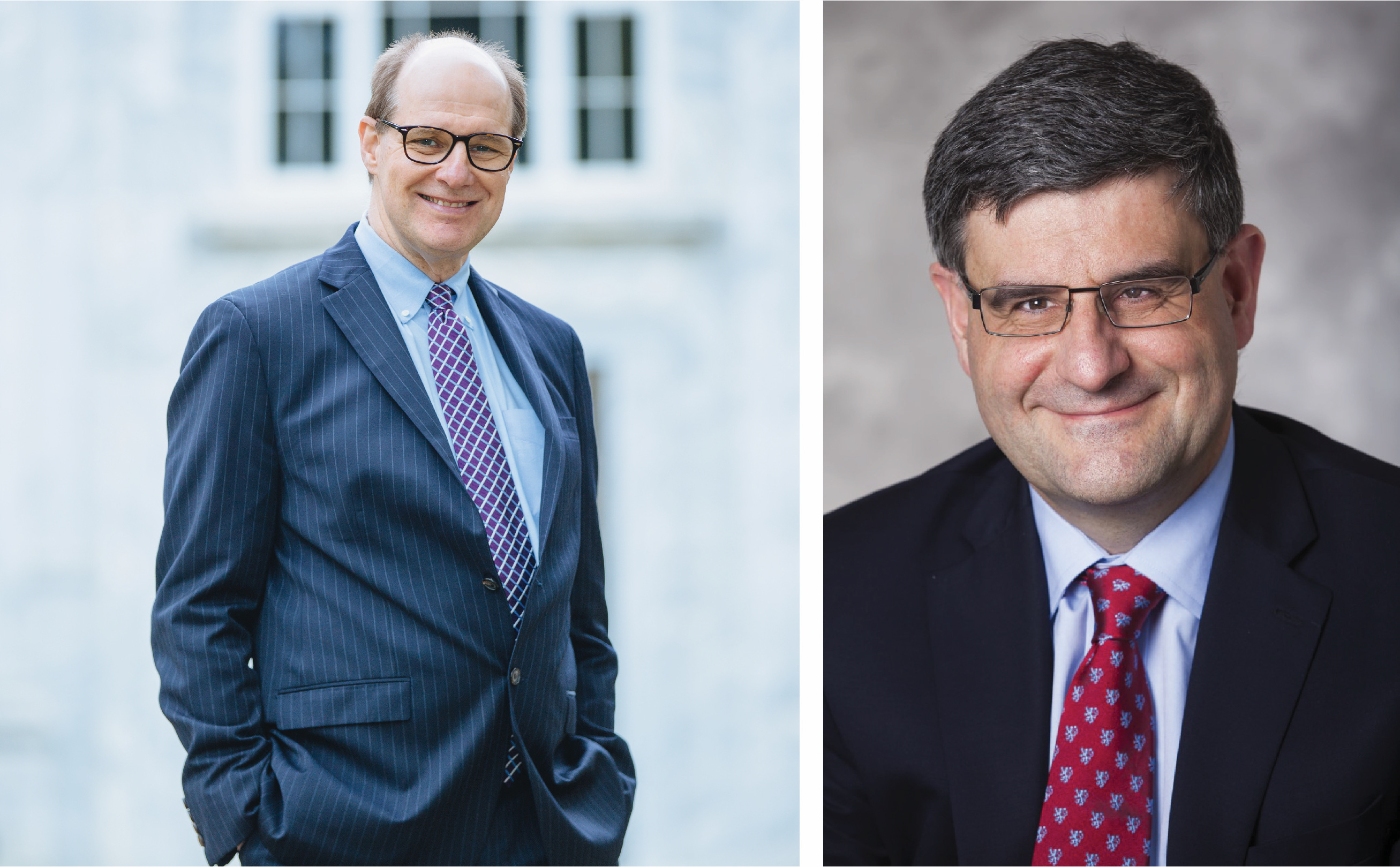Cambridge publishes titles by Witte, Domingo on law, marriage, French jurisprudence

John Witte Jr. and Rafael Domingo
Two Emory Law professors in the Center for the Study of Law and Religion have just published Cambridge University Press titles that examine historical and modern intersections of religion and law.
Church, State, and Family: Reconciling Traditional Teachings and Modern Liberties is by John Witte Jr., Robert W. Woodruff Professor of Law, McDonald Distinguished Professor of Religion, and director of Emory’s Center for the Study of Law and Religion (CSLR).
Witte says the stable marital household is “an essential cradle of conscience, chrysalis of care, and cornerstone of ordered liberty,” which has contributed greatly to churches, states and societies. Churches should “embrace the rights of women and children, as Christians have long taught,” he writes, while modern states should “promote responsible sexual freedom and family relations, as liberals have long said.” Witte also argues that citizens should “end their bitter battles over same-sex marriage and tend to the vast family field that urgently needs concerted attention and action.”
Witte describes the 500-page monograph, his 32nd book, as his capstone volume in the field of law, religion and family, which has been one topic of his research for the past three decades. He has published 10 other volumes on issues of marriage and family, including four other Cambridge University Press titles: Christianity and Family Law: An Introduction (2017) (with CSLR Fellow Gary Hauk), The Western Case for Monogamy over Polygamy (2015), The Sins of our Fathers: The Law and Theology of Illegitimacy Reconsidered (2009), and To Have and to Hold: Marrying and its Documentation in Western Christendom, 400-1600 (2007) (with CSLR Fellow Philip L. Reynolds).
This latest book has already earned praise, including a review by Iain R. Torrance, president emeritus of Princeton Theological Seminary. “The context of this engrossing, learned and far-ranging text is the way much of traditional family law has been elbowed aside in favor of new cultural and constitutional norms of sexual freedom, privacy and autonomy,” Torrance writes. “For his encyclopedic knowledge and historical incisiveness, John Witte Jr. has no equal, and this is a fair-minded and wise attempt at the reintegration of state and faith-based institutions.”
Great Christian Jurists in French History is edited by Rafael Domingo, Spruill Family Research Professor at CSLR and ICS Professor of Law at the University of Navarra, Spain. Domingo has published 25 other volumes. In this book, co-edited with leading French legal historian Olivier Descamps, he illustrates “the fertile interactions and lasting synergies between Christianity and law in French history,” even after the French Revolution. It explores the contributions of 27 brilliant French legal figures, made over centuries, to juridical ideas and institutions and also, how their faith and ideals helped frame the evolution of law and justice in France and beyond. The book contains new writing by distinguished legal scholars and historians, mainly from France, but also from Belgium, Canada, Germany, Italy, Spain, Switzerland, the United Kingdom and the United States. The collaboration between French and non-French scholars, and the diversity of international and methodological perspectives further distinguishes the book.
This book is one of a series CSLR has commissioned on “Great Christian Jurists in World History.” Cambridge previously published Domingo’s Great Christian Jurists in Spanish History (2018), and he is currently editing comparable titles on Italy and Latin America. Cambridge has also just published CSLR Fellow Philip L. Reynolds’s series entry, Great Christian Jurists and Legal Collections in the First Millennium (2019). Other forthcoming titles include great Christian jurists in Russian, German, Nordic, Welsh, Lowlands and Australian history.
The Center for the Study of Law and Religion produces and promotes path-breaking scholarship, teaching, and public programs on the interaction of law and religion around the world. CSLR is a thought leader dedicated to producing innovative scholarship, facilitating challenging conversations, convening the best minds, and training the next generation of academics, lawyers, and religious leaders to advance the global conversation on law and religion.